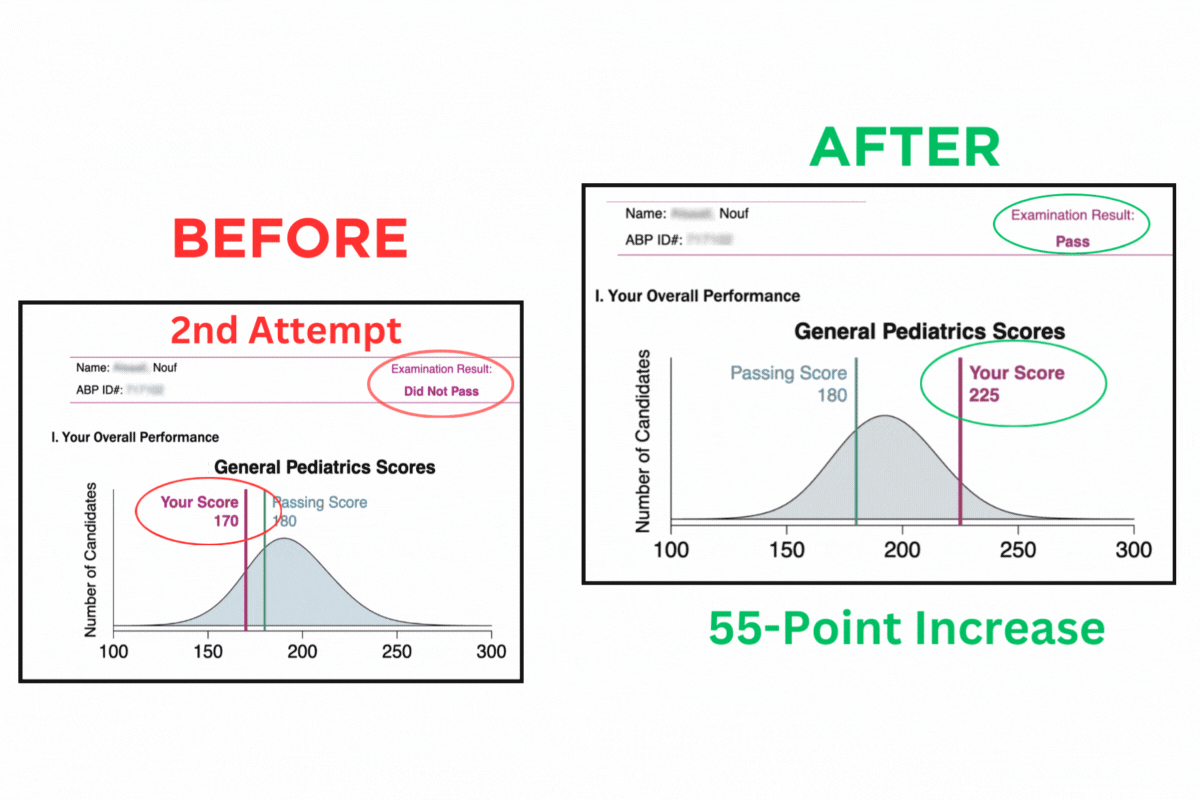Failed Pediatric Boards? Find Success with Our Blueprint
If You Failed the Pediatric Boards, It’s Time to Study Smarter (Not Harder)

A failed pediatric boards attempt is devastating. Although I'm now the author of the Pediatrics Board Review (PBR) study guides, I failed the American Board of Pediatrics (ABP) initial certification exam the first time I took the boards. I know what you're thinking, but before you throw yourself back into the depths of studying, here are two things you need to understand:
- Failing the boards doesn’t make you a bad pediatrician. You just need a comprehensive plan on how to recover after failing the boards.
- Passing the pediatric boards will have more to do with having a comprehensive strategy than studying harder.
After failing the pediatric boards, your chances of passing decline by almost 50%. Having helped pediatricians pass the boards after as many as NINE prior failed attempts, I'm confident that you can increase your chances of passing with an effective study schedule and the right study guides in place.
What Do My Pediatric Board Results Mean?
There are a number of factors that led to your pediatric board examination results being less than 180. It could be due to 1 factor or it could be due to 10 factors. Meaning, that if you are only focusing on the board scores in isolation, you are likely to repeat your mistakes and fail again in the board exams. While you're familiar with some of the factors that can lead to success on your pediatric board exam, there are many that you probably haven't considered. One important factor is creating a study schedule to ensure you cover all the necessary material. By following a study schedule, you can increase your chances of achieving high scores on your exam. These scores will play a crucial role in shaping your future as a pediatrician. Before you begin studying, consider all of the factors that could have led to your failure and strategize around them to create a comprehensive pediatric boards study plan.
Success Factors Related to Passing the ABP's Pediatric Exam
- Tailoring your study schedule is crucial for achieving high examination scores. Personalized preparation, with the guidance of mentors, can help mitigate the risk of failing the boards
- The pass rate of your pediatrics residency program is directly linked to the risk of failing your examination board scores
- Your USMLE Step 1 pass/fail scores in med school are related to your personal risk of failing
- Your in-training exam scores are related to your personal risk of failing
- Repetition of study content breeds reinforcement of difficult concepts
- Your available time and the density of your study materials will impact your ability to have repetition, which can greatly improve your scores
- Studying from multiple resources prevents repetition of your core resource and helps improve your understanding and scores
- Board review questions should be used to assess your test-taking strategy, not build knowledge
- Study sessions should be long and uninterrupted
- Multimodal studying at key points of your board preparation is crucial
- The ABP Content Outline and prior ABP score reports should not be the basis of your study plan
- Sleep hygiene should be excellent
- Personal, professional, and social obligations must be limited
- Distractions must be eliminated in order to have a “Deep Study”
- The time of day, when you study, is critical
- Abortive techniques for test-taking anxiety require practice
- Investment of time, energy, and money into success factors is required to pass
Study Schedule for Repeat Board Exam Test-Takers

This article outlines a detailed schedule that will help you pass the boards if you have failed the pediatric boards. Specifically, how to do so with materials that will help you (not fail you) during your next pediatric board exam. Remember, there are 3 pillars to passing the pediatric boards: Content, Test-Taking Strategy, and Commitment. Your failure(s) on the boards may have been due to a lack of knowledge or a lack of test-taking strategy. For most people reading this, failure was a result of a combination of both. For many, the commitment to spend the time, energy, and money to help secure the pediatric knowledge and test-taking strategy needed to pass the exam was also a major contributor. The 16-week schedule provided below will give you the pediatric knowledge that you need to pass the boards. For help with test-taking strategy, poor attention to detail, falling for traps on the board exam, challenges with pacing, and problems attaining high-quality studying, the PBR article on test-taking strategy is a must read. Throughout this study schedule, you’ll find references to the AAP PREP® series of questions. Note that while those questions are well-structured and thorough, you should use multiple question banks this year. Use each question to help you develop, or refine, your test-taking strategy. Do not use questions as a source of study material. You can learn much more about this recommendation in a PBR article on how to best use the AAP PREP® questions. If you are a first-time test-taker, and you consider yourself a good test-taker, you have done well on prior board exams, and you come from a residency program with a high pass rate, then this schedule isn’t right for you. Read the PBR article discussing a less rigorous 14-week study schedule for first-time test-takers.
The Benefits of Starting Board Preparation Early
Please note that while the 16-week schedule in this article provides the pediatric knowledge needed to pass the boards, I strongly recommend starting as early as January. Repetition reinforces learning, and this allows for a a greater opportunity for multiple rounds of reading. Additionally, starting early gives you the best chance of staying on track, even if unexpected personal or professional events arise. Remember, this schedule is just one part of the overall preparation process, and beginning sooner will significantly increase your likelihood of success.
THE “ASHISH GOYAL” HIGHLIGHTER TRICK
 Before you dive into studying, it's important to understand how to best use a highlighter to increase your efficiency as you go through the schedule. As a high-risk test-taker, you should aim to repeat your core material (the PBR Core Study Guide and the PBR Q&A Book) at least 5 times. With a little help, this is absolutely doable. For each round of the material, highlight (or underline) only the areas you are interested in reviewing again. If you believe that you know something well enough to recall it on the day of the exam, don’t highlight it. If you believe you need to review at least 1 more time, highlight it.
Before you dive into studying, it's important to understand how to best use a highlighter to increase your efficiency as you go through the schedule. As a high-risk test-taker, you should aim to repeat your core material (the PBR Core Study Guide and the PBR Q&A Book) at least 5 times. With a little help, this is absolutely doable. For each round of the material, highlight (or underline) only the areas you are interested in reviewing again. If you believe that you know something well enough to recall it on the day of the exam, don’t highlight it. If you believe you need to review at least 1 more time, highlight it.
How using different colors can aid in information retention and organization
For the first round, use a light-colored highlighter. In subsequent readings, switch to a slightly darker shade each time and focus only on the content highlighted in the latest round. If it wasn't highlighted in the latest round, skip it. There's no need to revisit familiar material and waste precious study time at this point in the process. In one of your later rounds of going through the material, you should skim through any information that has not been highlighted in the latest round. For my highly successful second attempt at the boards, I used these colors during each study pass:
- Pale Yellow
- Pale Pink
- Pale Orange
- Pale Green
- Pale Blue
On your first pass, you might highlight up to 80% of the book in yellow. That's normal. By the 5th pass, you might only need to review 20%-30% of the content marked in green. In the final weeks, focus only on the blue-highlighted areas and go through those sections as many times as possible before the exam. This approach will help you curate your study sessions to concentrate on areas that are specific challenges for you, rather than wasting time reviewing familiar topics.
16-WEEK PEDIATRIC BOARDS STUDY PLAN OVERVIEW
This comprehensive study schedule includes both PBR books (Core Study Guide and Q&A Book) and AAP PREP ® questions. Set aside 500 hours to go through approximately 440 pages of core content and over 700 practice questions. Here’s the schedule breakdown:
- Weeks 1-4: First round through the core content
- Weeks 5-10: Second round
- Weeks 11-14: Third and fourth rounds +/- practice exams (aka mock exams)
- Weeks 15-16: Fifth round +/- a mock exam
As a repeat test-taker, the key to your success will be to read the PBR material at least FIVE times to establish familiarity, identify patterns in the material, and promote strong reinforcement through repetition. The pediatric board exam focuses less on how much ‘knowledge’ you have, and more on your ability to select the right diagnosis or next step. By identifying the similarities and differences between diseases, you will get a deeper understanding of the material., and by learning test-taking strategy, you will be able to answer some questions with only limited knowledge. Spend no more than 5 minutes on each of the 700 questions (an average of 75-90 seconds to answer each question and no more 3.5 minutes to review). At 5 minutes per question, that’s about 60 hours (700 questions multiplied by 5 minutes). Again, use this time to focus on test-taking strategy rather than focusing on trying to learn pediatrics by going through questions. As you get closer to the exam, decrease the time per question to 75 seconds since that’s what will be expected on the actual exam. You will spend the remaining 340 hours going through the PBR core content. Make sure you treat both PBR books (Core Study Guide and the Q&A Book) as core content that you must know. Okay… here we go!
FAILED PEDIATRIC BOARDS STUDY SCHEDULE WEEK #1 – WEEK #6: ROUND 1
Allocate 130 hours over 6 weeks in your study schedule (roughly 21 hours each week). The goal for the first 6 weeks is to read through everything carefully and make all the notes, drawings, and mnemonics you need to ensure complete understanding. Highlighting/underline/bracket only the areas that you think will need more review and repetition. Read the PBR article on creating mnemonics if creating mnemonics doesn't come naturally to you. Aim for an average of 18 minutes per page to cover approximately 430 pages of core content. Do any cross-referencing of facts needed but spend no more than 5 minutes outside of the PBR resources so you don’t get drawn into the black hole of Google. If you still struggle with some of the content, then post your questions in PBR’s private Discord group. Break up your studying with an average of 5 AAP PREP® questions per day to work on your test-taking strategy. At 35 questions per week, you should be aiming for 210 questions over this 6-week period. Questions will take about 3 hours of your time each week. This first 130 hours is crucial to anyone who has failed the pediatric boards. Approach this as a marathon, not a sprint.
FAILED PEDIATRIC BOARDS STUDY SCHEDULE WEEK #7 – WEEK #10: ROUND 2
After having gone through the book in painstaking detail once, the second round should be much quicker (approximately 86 hours). Aim for an average of 12 minutes per page. Like the first 4 weeks, break up your studying with an average of 5 AAP PREP® questions. Aim for 5 min per question, including the answer review. By the end of Week #10, you will have completed an additional 140 questions for a total of 350 questions.
FAILED PEDIATRIC BOARDS STUDY SCHEDULE WEEK #11 – WEEK #14: ROUNDS 3 AND 4

Stick to the schedule and stay disciplined. You should now be familiar with the PBR content, but continue reviewing the books a few more times to develop the solid knowledge base you’ll need to pass the exam. For the next 4 weeks, read the PBR materials 2 more times. Aim for approximately 10 minutes or less per page (roughly 72 hours per round). If the 3rd read through takes 3 weeks, that’s OKAY because your 4th and 5th readings are even faster. Also, there is built-in “cushion” time within this schedule. For these two reads, focus on refreshing your memory of familiar topics and work to cement your knowledge of the difficult ones. If you're mentally struggling or have questions about the PBR content, reach out to members of the private Pediatrics Board Review Discord Group or submit your questions through the PBR “ASK THE EXPERT” question portals. If you find that you are moving through the content faster than 10 minutes per page, consider using the extra time to review recently visited chapters to promote even greater repetition of the challenging topics. Continue working on questions with an average of 5 AAP PREP ® questions per day. At this point, you may want to consider batching questions and doing 12-18 questions per sitting as you aim for your 35 questions per week. If you would like to do a mock exam before the exam, this would be a good time to set one up to work on your pacing and your test day schedule (more details below).
FAILED PEDIATRIC BOARDS STUDY SCHEDULE WEEK #15 – WEEK #16: ROUND 5
By the 15th week, you should have made it through at least four rounds of the material. You should now have a solid foundation of the pediatric knowledge needed to pass the boards. During your 5th reading, VERY quickly read the topics you know well to ensure your understanding is correct and continue to focus on the more challenging topics in depth until they’re cemented in your mind. The challenging topics should be easy to identify if you’ve been using different color highlighters for each successive reading. Since you will primarily be reviewing the difficult topics, it’s possible that your average pace could be faster than the recommended 10 minutes per page. Use the extra time to hone your test-taking strategy, review recently visited chapters, or do a mock exam. If your exam is within two weeks, the best thing you can do during this time is to repeatedly review the areas you are struggling with as many times as possible. That will be the key to your success. Continue practicing your test-taking strategy on practice questions from the AAP and other question banks. By the end of the 16th week, you will have done about 560 questions (35 per week x 16 weeks). That leaves 140 questions remaining to reach 700. By this point, you should be comfortably pacing at approximately 75 seconds per question, and you should consider doing larger batches of questions.
HOW TO SET UP PEDIATRIC MOCK EXAMS
While studying is a crucial part of passing the boards, getting familiar with the test environment is just as important for your pediatric board prep. If time allows, I recommend taking at least 1 mock exam before the actual exam. This will give you a good understanding of how the very long day of testing will go. You can consider taking one full exam in a day, or you can consider taking a half-mock exam one morning and another half-mock exam the next afternoon to gauge your energy levels at different times of the day. Here are a few key tips to keep in mind when setting up your mock exam:
- Use multiple question banks. Many different pediatricians across the country write questions for the boards. This means every question can have a different personality to it (I would know since I've written questions for the ABP too). Getting familiar with the many different ways questions can be written ensures that you will not get blind-sided on test day.
- Recognize that taking a mock exam is about more than your score. It’s about understanding the challenges and barriers that come with a very long day and then optimizing your behaviors to ensure that you are the best version of yourself from the beginning to the end. Start working on your test day habits now, and replicate them on test day.
- Set up your exam block timer and the timer for your breaks exactly as the ABP sets them up. If you need help setting up a mock exam, be sure to read the PBR article on the exam structure of the ABP Initial Certification exam.

Watch Your Free Video Training Session Now
Learn HOW to Answer Board Style Questions &
Be a Better Test Taker
LEARN FROM OTHERS' EXPERIENCES
Watch the videos below to see how these PBR members overcame prior failed pediatric board experiences.
DR. STEPHANIE MOSES
Dr. Moses made the common error of studying from board review questions. Watch this video to see how ultimately passed the boards.
DR. YESSENIA CASTRO
Dr. Castro made the mistake of trying to use multiple resources to study. She failed five times but got a great new job and $20,000 more in her annual pay after passing. Watch the video below to see how she did it.
DR. KERRI LOCKHART
Dr. Lockhart passed every medical board exam until the ABP initial certification exam. She even failed once with PBR because she refused to invest the recommended resources. Watch the video below to see what happened after her third failed attempt.
The members above passed after attending PBR's Live Test-Taking Strategies & Deep Study Course. If you truly want the best chance of passing, learn about PBR's VIP Bundle that helped one doctor pass after NINE prior failed attempts. Do you have the right resources and the commitment to do what is needed to pass the boards? If you follow the study schedule outlined above, and if you use the VIP Bundle to include a strong focus on test-taking strategy, then you will pass the pediatric board exam. The Live Test-Taking Strategies & Deep Study Course is included in the VIP Bundle, and it is an absolute must for every pediatrician who is at moderate or high risk of failing the boards. The VIP Bundle also includes the No Brainer package, which includes PBR's multimodal study materials to help you build your fund of knowledge, an Online Test-Taking Strategies Course (a great warm-up for your Live Test-Taking Strategies Course), and up to three 90-Day Personalized Study Schedules created by Team PBR. After filling out a questionnaire about yourself, your pace of reading, and your available days to study, Team PBR will take care of the rest.
Not a PBR member yet? What are you waiting for? Click HERE now and get ready to pass the pediatric boards!



